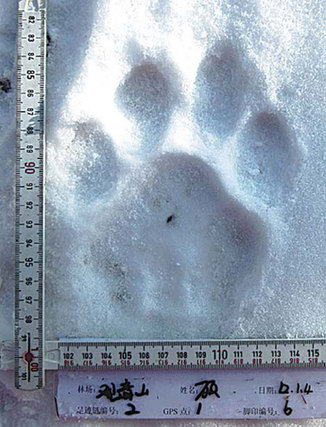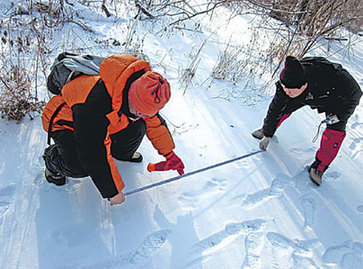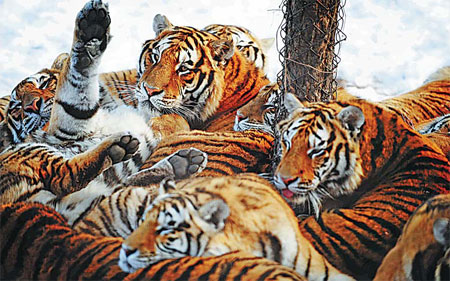Conservation, think tanks
Efforts to protect tigers in China have accelerated during the past decade, after years of ignorance, providing a boost for the prospects of a rise in the global population.
 |
|
A tiger print in the snow. Provided to China Daily |
To integrate the research and protection forces in June, China set up the feline research center at Northeast Forestry University in Harbin, led by a renowned Chinese wildlife expert, Ma Jianzhang. The team includes dozens of experts on felines from home and abroad.
"All our work is aimed at encouraging the return of groups of tigers that moved to other countries decades ago," said Jiang Guangshun, deputy director of the center.
"The tiger's living area is much larger than that of the giant panda. So research and protection require cross-border cooperation," said Jiang. The home range of a tigress is about 350 square km, almost 90 times greater than that of the giant panda, and a male tiger's range is double that of the female.
In addition, the protection needs international cooperation because the animals are multinational, migrating between countries. Construction of the cross-border migration corridor and work to prevent illegal hunting both require the participation of all countries involved.
"We want to build this center into an international cooperation platform and tiger protection think tank for the forestry administration," Jiang added.
Cross-border cooperation
Experts say the Sino-Russia cooperation is one of the most important factors in tiger protection and restoration.
On the one hand, Russia has a large tiger population and experience in boosting and restoring the food chain. According to the State Forestry Administration, there were around 30 tigers in the former Soviet Union in the 1950's. That number increased more than tenfold after 50 years of protection and restoration work, but the fragmentation of the former Soviet bloc saw numbers begin to decline again.
 |
|
WWF experts trace tigers in Heilongjiang province. Provided to China Daily |
The center cooperates with the Russian authorities in monitoring the tigers and studying their prey.
Sources from the WWF said that Vladimir Miklushevsky, governor of Russia's Primorsky province, signed a decree on the creation of the regional Sredneussuriisky Wildlife Refuge on Oct 18. The territory is the only corridor connecting the endangered tiger population in the Wanda Mountains, located in the east of Heilongjiang, with the main population in Russia.
"This refuge is a key part of the Sino-Russian cross-border corridor for Siberian tigers. We could never achieve the recovery target goal in northeastern China and provide support for tigers in Russia without it," said Yury Darman, director of the WWF-Russia Amur branch.
Jiang revealed that in December, China and Russia will conduct a joint study of tiger numbers and distribution. The WWF and local forestry authorities will also play a part in the study.
The challenges
In spite of the attention from government to academia, the return of the wild Siberian tiger is still uncertain. Experts suggest the challenges include limited funding, devastation of plant species and destruction of the natural habitat.
First of all, many tiger protection zones are under rigid administration and receive no funding from central government. The conservation zones are operated by local forestry bureaus instead of provincial or national environmental protection bureaus, and these low-level bureaus lack funds.
The limited number of plant species is another challenge. The majority of the northeast region is covered by cultivated forest which is unable to provide enough food for large ungulates such as sika and red deer and wild boar, the staple foods of Siberian tigers.
"The local forestry department and WWF are trying to increase the numbers of these animals. But the recovery of the food chain is likely to take a long time, given the high costs and low survival rate," Fan said.
Finally, increased construction of roads and urban expansion are having a negative effect on the tigers' lifestyles and reproductive habits as their natural habitat dwindles.
Experts suggest the promotion of sustainable forests and protected areas has started to reverse the longstanding decline in tiger numbers, but the challenge now is to maintain enough suitable forested habitats.
 |
|
Tigers at rest at the Harbin center. Wang Jianwei / Xinhua |
Liang's dream
Liang was pleased to see that his efforts have been rewarded as many hunters now refuse to kill wildlife. Some of his friends and neighbors have changed their opinions on the animals and have even started to offer valuable clues on how to stop illegal hunting.
In recent years, tigers have been spotted frequently in the area around the Suiyang Forestry Bureau, giving Liang and his fellow workers cause to hope that some of the big cats may settle down and produce litters of cubs.
"I'm still working on the front line of tiger protection. I understand that it's not easy to save tigers. But I know I'm not alone because people across the nation have the same belief as me," said Liang.
Contact the writer at wuyong@chinadaily.com.cn
Zhou Huiying and Han Junhong contributed to this story.
